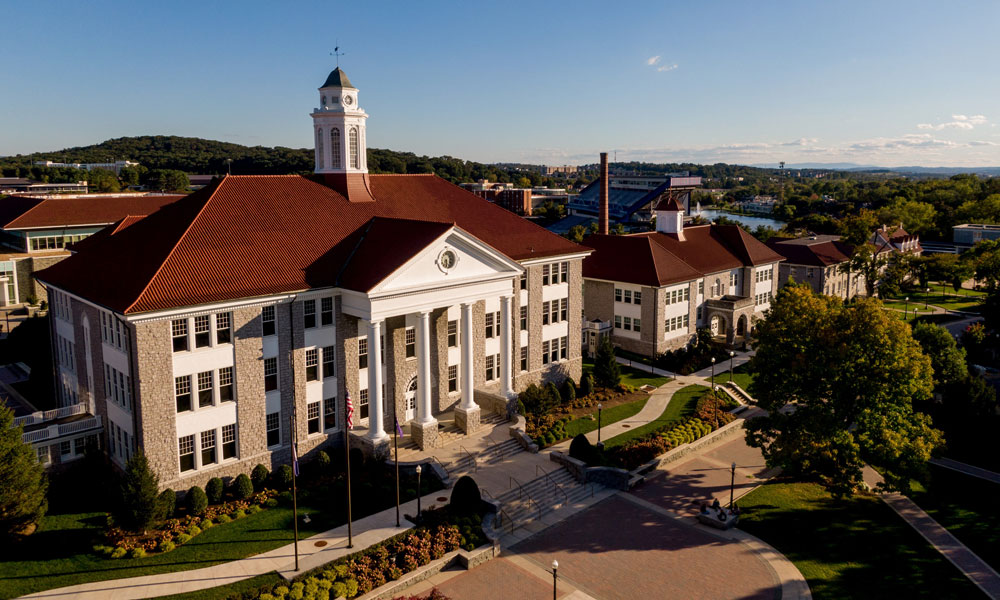Transformation through Liberal Education
Office of the Provost
Five distinguished JMU faculty recently spoke about their role in providing students with a transformative liberal education experience: Tim Ball (Communication Studies), David Daniel (Psychology), Kathleen Ferraiolo (Political Science), Joy Ferenbaugh (Integrated Science and Technology) and Kristin St. John (Geology). These individuals participated in an innovative plenary panel as part of the annual General Education Student Conference, and they were chosen because each has been a finalist for or recipient of the program’s Distinguished Teaching Award. Their comments underscore the commitment instructors in the General Education program have to excellent undergraduate teaching.
When asked to state the “most important thing you want students to know after taking your class,” they uniformly agreed that, in the age of Google, narrow course content takes a back seat to higher-order, cross-cutting learning outcomes. Tim Ball, who teaches Human Communication, replied, “I hope my students understand how to create and respond to messages, depending on the context, the audience, the purpose, the discipline . . . and I really hope they take away information literacy skills that they can apply in other classes.” For Ferraiolo, by contrast, who teaches American Government, the end goal is for students “to be informed voters, so that, when it’s time to vote, they feel they know where to go to get information so they can make a good choice that aligns with their interests and values.” And St. John, who teaches Earth Systems and Climate Change, said she stresses “how we [scientists] know what we know, how we recognize problems and work through evidence to come to conclusions. Then they can take that knowledge and better assess what you can trust and what you can’t trust.”
During a Q&A session, a parent noted that many General Education classes are large and asked the panelists to explain how they engage individual students under such circumstances. Their answers were telling. David Daniel, a nationally-recognized expert in teaching mass sections, cautioned against using class size as “any sort of measure” of whether students are learning or not, stating, “It’s how you do that [teach large classes]” that matters. Besides pedagogical techniques designed specifically for his 300-seat lecture class, Daniel created a dedicated resource room where students can come to review their tests with him one on one. “Do I know your name, do I know where you come from, do I know your parents, your specific situation, that kind of thing?” he said, “No, not a lot of that, but to where they feel they are relevant, where they are engaged, where they can take risks, things like that, that kind of class culture? Yeah, you can do that in a large class.” Ferenbaugh echoed his point. “I have a pretty close connection even with my students in my bigger class just because of the way the class is run,” she explained. “There are different techniques to use [than those for a small class]. . . Am I going to be able to able to recognize them all in the hallway and say, ‘Hey, Josh’, no probably not, but can I tell you, ‘Oh, you weren’t there last week,” or “You missed this assignment,’ or ‘Hey, I saw you at the football game.’ And at that point they don’t care if you can remember that their name is Josh. They’re like, ‘Oh my God, she saw me in a crowd!’ . . . So, you can engage with them without having to be on that detailed level, by letting them know you think they are a person . . . and that you’re interested in their individual outcomes and learning.” However, most sections of General Education courses actually range between 50 and 110 seats. And as Ball pointed out, many disciplines deliberately require small classes, like Critical Reading and Writing, mathematics and his own presentations course, which runs about 30 seats.
This panel, like the conference as a whole, recognizes the close faculty-student relationship that is a hallmark of JMU. That this relationship persists despite rising enrollments is a very good thing for our students. According to a 2014 Gallup-Purdue study, Great Jobs, Great Lives, college graduates who had at least one professor who made them feel excited about learning, cared about them as persons and took the time to mentor them reported significantly higher levels of overall wellbeing and workplace engagement than graduates without these experiences. Professors like the panelists do these things every day. Reaching beyond the classroom, all presenters have been involved in the General Education Student Conference, whether as moderators of student panels, nominators of student work or keynote speakers.
This year, faculty nominations resulted in 147 student presenters sharing exemplary work undertaken the previous fall or spring semester. Although the classes had long since ended, many nominators coached their former students and helped them prepare their presentations. Student feedback suggests how much they derive from the experience. “I really enjoyed my GenEd class I did my paper for,” said one student, “and this conference was a good way to give back to my teacher and show my appreciation for my class.” Others came away with an appreciation for the value of liberal education, more respect for their fellow students’ achievements and a sense of personal accomplishment for having participated in a formal, academic event.
To many program faculty, these are the kinds of humanistic outcomes that make general education classes so rewarding. “Years after, you’ll get letters or emails from students saying ‘I saw this’ and ‘It helped me with my family’ or ‘It helped me with my job,’ or whatever it is,” Daniel commented. “[I’m] setting up a culture where they’re connecting their experience with their life, setting up a rhythm for things after they leave class. And that’s cool. You get a lot of feedback. That’s the really neat thing for me. That’s why I like what we’re calling ‘GenEd.’”
